If you’re interested in starting an online business, you’ve probably seen posts like this everywhere.

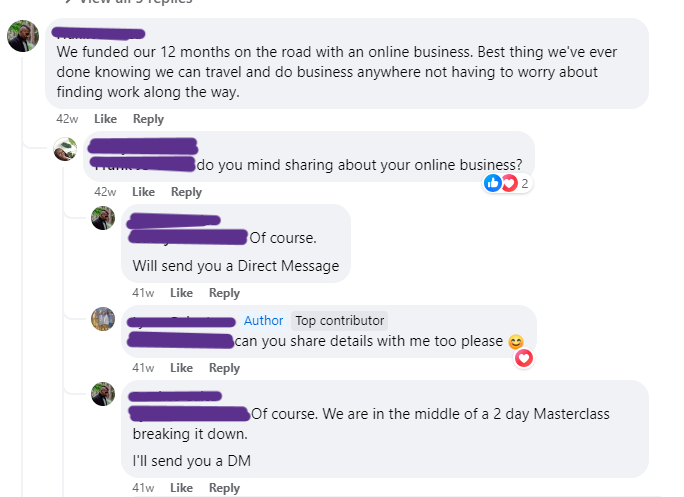
And you’re now wondering ‘WTF is this high-ticket affiliate marketing stuff that everyone seems to be talking about? It looks pretty good. Lots of people seem to be doing it, and they’re sharing great travel pics and raving about how easy it is – maybe I should get into it?’
I’m here to explain exactly what high-ticket affiliate marketing is, and why you should be very, very careful before you hand over money to anyone peddling this.
But first, a bit of background on affiliate marketing.
Table of Contents
What is affiliate marketing?
Plain affiliate marketing has been around for quite a while.
In its simplest form, it involves sharing a link with tracking attached.
Here’s my affiliate link for MailerLite. You can see the tracking code at the end.

When someone clicks on that link, a cookie is placed on their device indicating they used my link.
If they decide to purchase within the approved period I will receive a commission from that sale.
I’ve done this type of affiliate marketing for years. On my previous site I did homeschooling product reviews like this one, and when I talk here about software I use like MailerLite or Thrivecart I use my affiliate links.
Simple, right? You share a link, usually with some information that helps people decide if it’s right for them, like a review, and if people purchase after using that link you receive part of that sale.
Therefore, affiliate marketing is legit – as long as you disclose your links and are truthful about the product and your experience with it, of course.
So it follows that high-ticket affiliate marketing means you’re selling high-ticket, or high price, products, and it’s also legit, right?
Well, I’ve seen people use it like that before – standard affiliate marketing but with high priced products, therefore high commissions. And if you read articles about it from before 2019 that’s what you’ll find.
But that’s not exactly the way most influencers are using the term now…..
What is high-ticket affiliate marketing now?
I was pretty sure I knew what all the people using this term were up to, but I thought I’d investigate so I could be 100% sure.
I went to a few travel groups on Facebook and searched for ‘affiliate’. I also went to Instagram and searched the #highticketaffiliate hashtag.
I found a lot of ‘inspiration’ with a side of shaming.
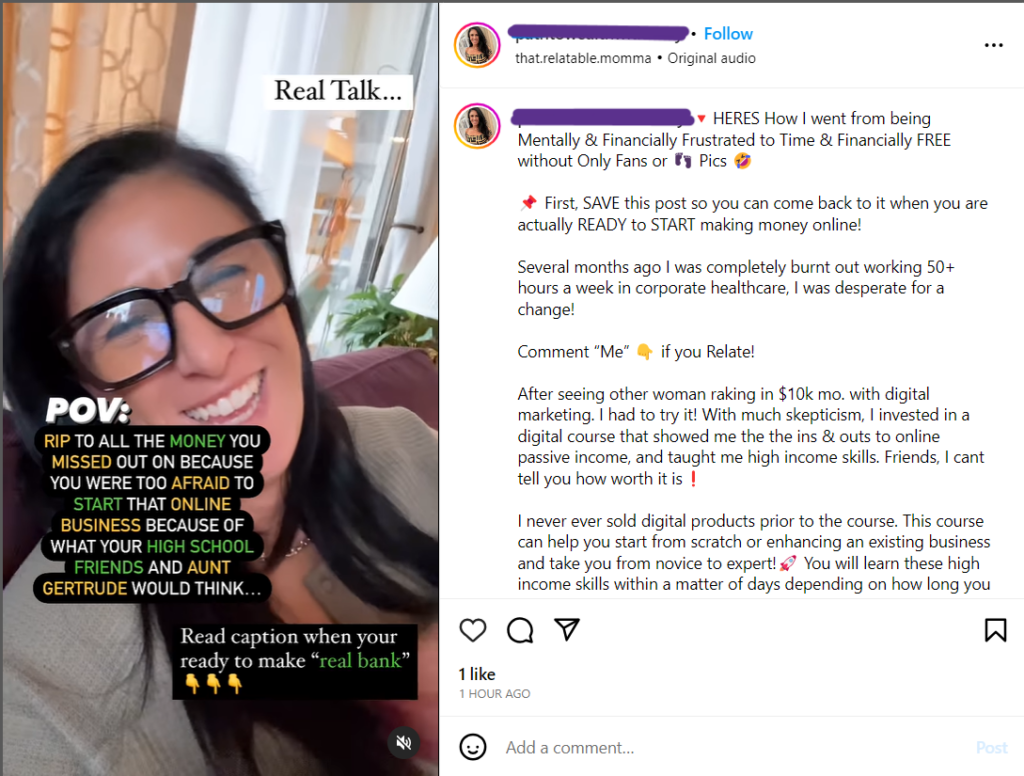
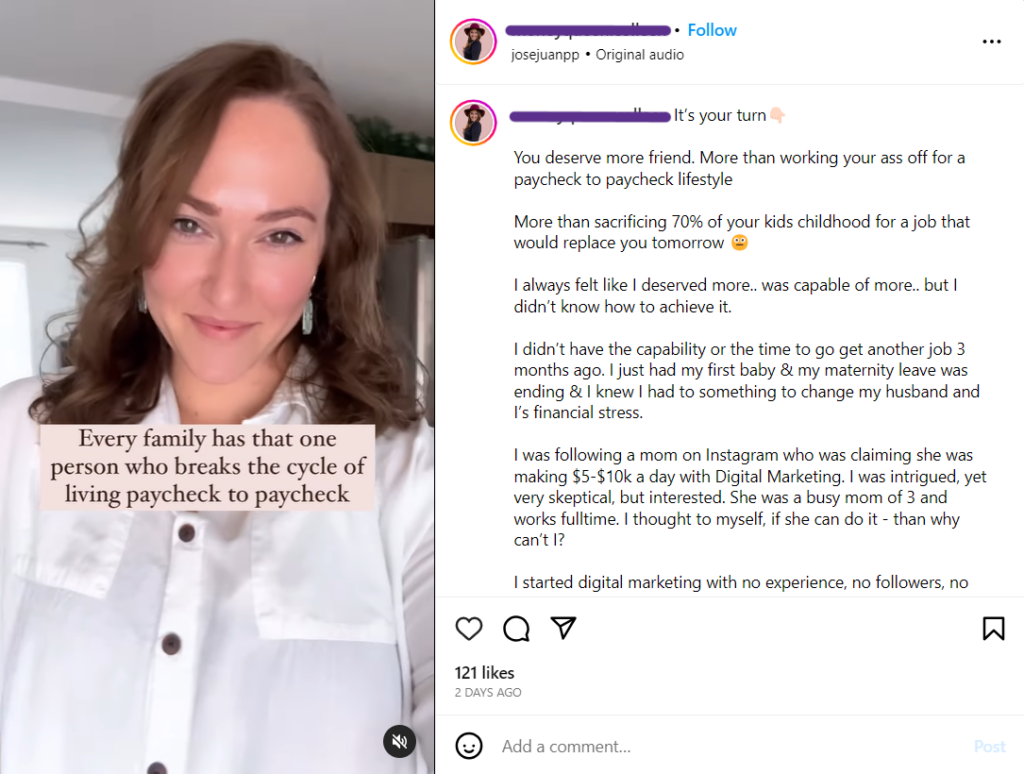
I messaged a few people to say yes! I want to hear more about this!
With the appropriate level of excited exclamation marks, of course.
Because anyone would be excited to find out about their dream work-from-anywhere job that’s full of six-figure passive income and just involves posting on social media like you do anyway, right?
Here’s what happened.
A handful of people directed me to their social media accounts for more info.
From others, I got messages with questions about why I was interested.
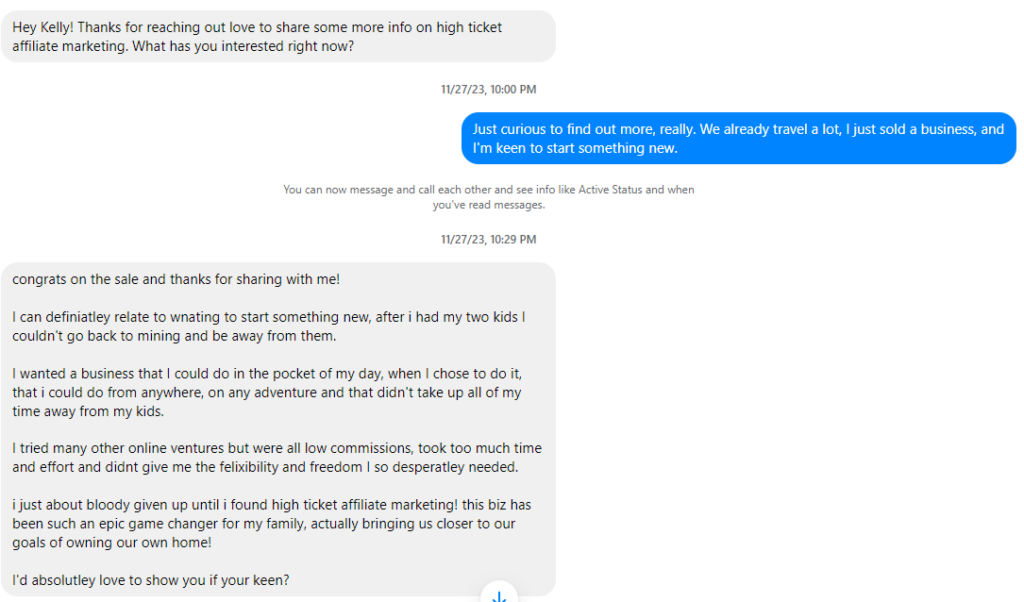
Then I was invited to a group, which had a masterclass I was tagged into.
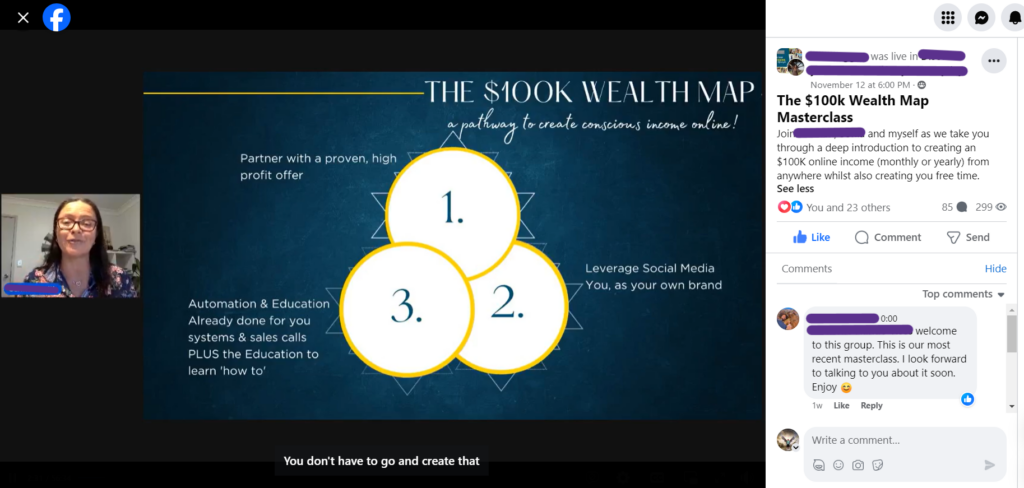
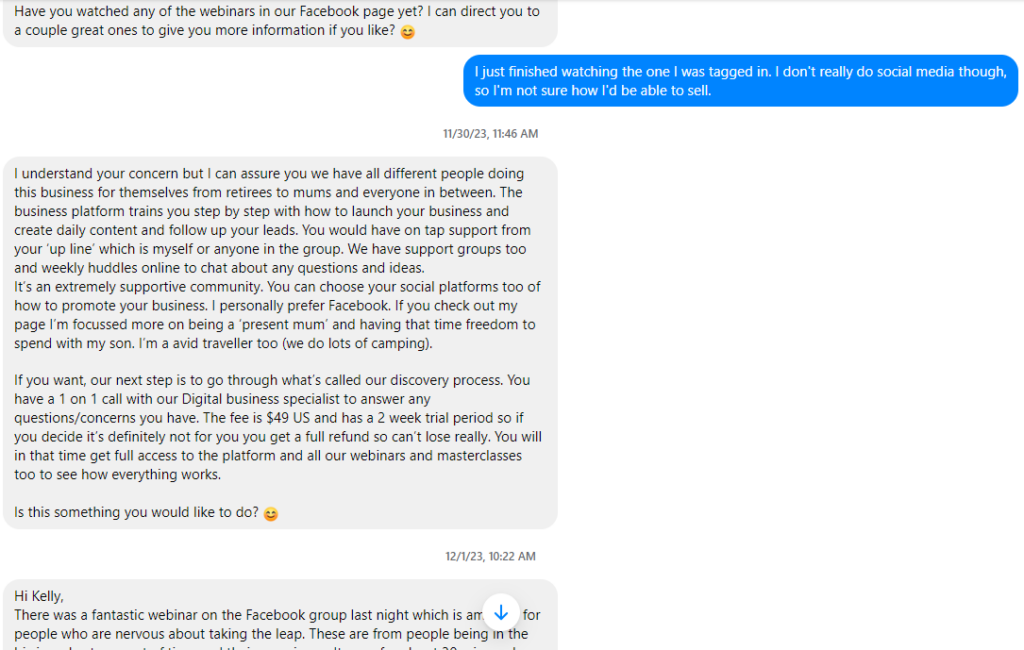
The masterclass focused very heavily on telling me that I’d barely need to make any sales, and I’d receive long-term commissions. There was much, MUCH more time spent talking about freedom and potential and looking after my family than there was about what I’d actually have to do to create this.
In fact, I finished the masterclass and still wasn’t sure exactly what I’d be selling or how I’d do that – they were selling the dream, not the reality.
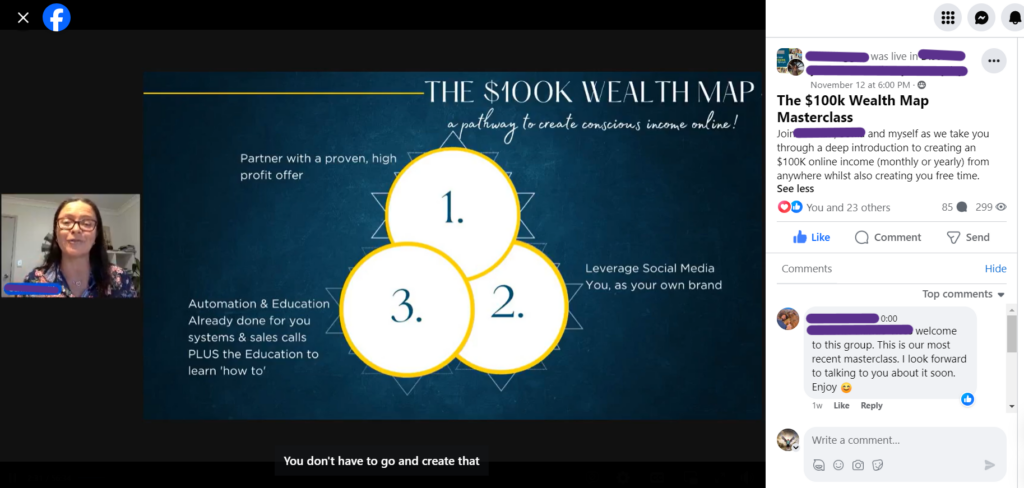
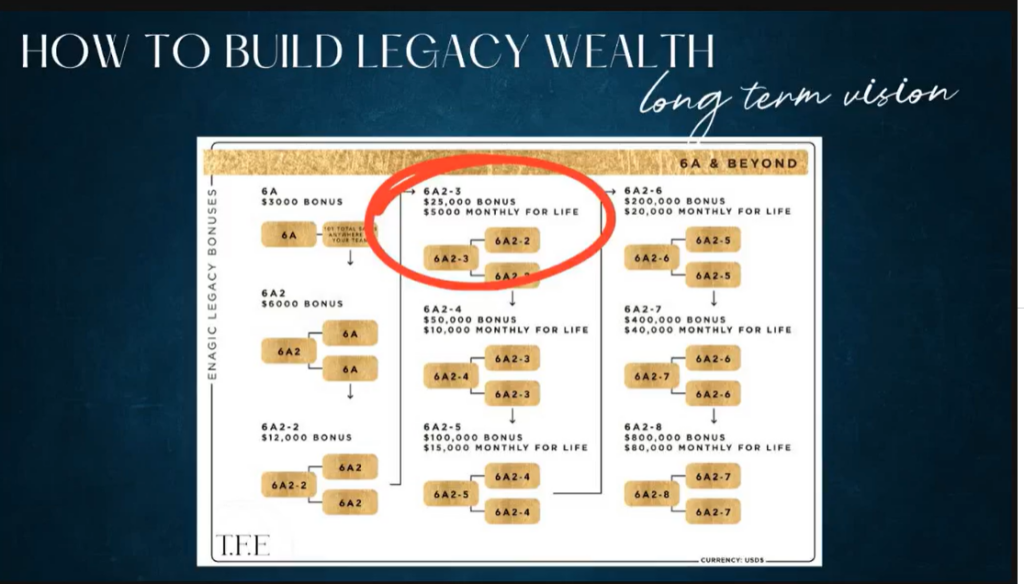
My next step would be to join their paid membership program, where they would teach me how to set up the ‘business’.

If I continued I would have then needed to purchase the product for myself, but this wasn’t specifically mentioned.
It was further up the stairway of commitment – first, watch something.
Next, pay for the membership.
Next, ‘invest’ a few thousand on a pseudoscientific water filter.
Next, ‘invest’ money in more training, seminars, conferences, etc.
I also got friend requests from random people, who I assume were my potential uplines (the people who would receive commissions from my sales).
I also received multiple messages from people who were very friendly. They all wanted to welcome me to the community and encourage me.
It SOUNDS lovely and can be very tempting, especially to people who feel lonely or isolated, but it’s actually a cult technique called love bombing. It’s a way to manipulate people into joining a group or community by creating the feeling that we need to reciprocate and also be friendly and agreeable – because that’s how they make money, by signing up more sales people.
It also targets people who are lonely and needy. Ugh.
It was all relentlessly positive, and they used the words ‘freedom’ and ‘community’ and ‘personal growth’ and ‘life-changing’ a lot. I have some knowledge about the nastier parts of persuasion marketing and NLP because I’ve been in online business for a long time, and I’ve been exposed to a lot of shady tactics.
The ‘workshops’ were full of unethical triggers to subtly make me feel like a desperate loser that could improve myself, but only if I leaned on them and followed their process. And it was all tailored to push me into each step – they’ve spent a LOT of time and money on these scripts.
I stopped pretty early on. I didn’t want to waste their time, because let’s face it, I’m never going to sell $7000 water filters (does anyone? really?)
I also received invites to a few other similar schemes –
- taking white-label courses and putting my branding on them and selling them as my own (with the insinuation that all I’d need to do is whack it up online and the sales would come rolling in). The main goal, though, was to sign others up for the same deal, under me.
- This site came up from a few bio links and seems to advocate stealing other people’s content….

So from my research, everyone talking about high-ticket affiliate marketing is trying to recruit you to their MLM.
Quick note: what’s an MLM?
MLM stands for multi-level marketing, aka network marketing or direct selling. Essentially it’s a pyramid scheme, just with products.
Even though there’s a product involved, it’s more lucrative to recruit salespeople under you because you’ll receive commissions from their sales and sign ups. And from the people they recruit so on, down to the base of the pyramid.
You make the majority of your money from convincing other people to sell the stuff, rather than actually selling stuff. You’re essentially building your own small pyramid of sales people underneath you, and hoping they’ll sell enough that your share of the commissions will give you a decent income.
The term MLM has a bad name. So it was rebranded as ‘network marketing’ or ‘brand representative’. Then people got wise to that, so now they’re calling it ‘high-ticket affiliate marketing’.
Once people catch on to that, they’ll call it something else.
But as we say in Australia – same shit, different bucket.
Is high-ticket affiliate marketing a good business opportunity?
So it sounds pretty good, right?
You join an established company, you sell their stuff, and you earn commissions.
Just like our mums and grandmas did with Tupperware, Avon, Mary Kay, and Amway.

Well, maybe not. The statistics paint a pretty grim picture.
The FTC found that 99.6% of people earned no profit at all from joining an MLM.
Of course, this means that only 0.4% of people earned any profit at all, even if that profit was only $10.
Which means that nearly 99.6% of people LOST money.
They sum it up rather scathingly in this document.
Joining and MLM is like saying ok, I want to earn a lot of money. I’m going to play professional tennis and be the next Roger Federer!
If he can do it, so can I!
Yeah. Good luck with that.
More recently, the AARP foundation studied MLMs, and the data is summarised and linked here.
They found that on average, one in 545 is likely to have profited after subtracting expenses, but of those only a very tiny percentage made more than $10,000. They concluded that ‘997 out of 1,000 individuals involved with an MLM lose money (not including time invested).’
About two-thirds of the participants in The AARP Foundation’s MLM study said that they would not join the same MLM company after knowing what they know now.
Finally, Enagic (the company with the masterclasses above) has this table on their site.
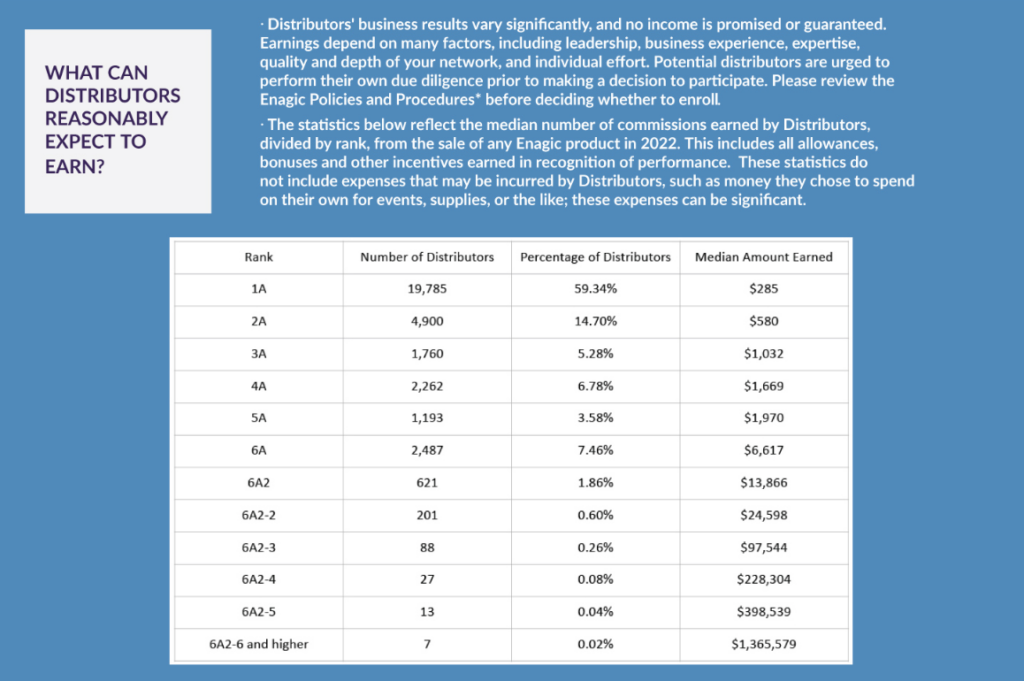
Please note that only 135 out of 33,344 distributors, or 0.4%, make close to, or over $100k per year.
It debunks the claims that 100k years (or months) are doable for most people.
And the numbers are revenue, not profit, so there’s no indication of what people actually end up with in their bank account after buying products and paying for courses, training, conferences, and all the other stuff that’s expected in an MLM – as Enagic says, those costs can be significant.

There’s no way I’m pouring all my effort and thousands of dollars into a ‘business’ that will give me less than 1% chance of NOT losing money.
It makes the pokies look attractive.
This pisses me off about ‘high-ticket affiliate marketing’
I teach online business.
Legit, ethical, sustainable online business.
The type where you use your knowledge and experience to create something useful and sell it, and actually help people, and get lifelong fans.
And it feels like all these high-ticket affiliate marketing clowns are bombarding people who want to start a legit business with their scammy MLM pyramid scheme crap, and turning people away from the actual opportunities.
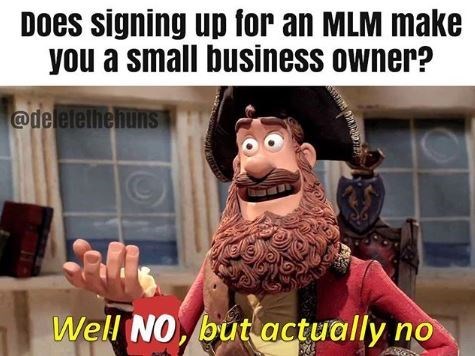
I’ve always been open about what I do. I tell people who ask in travelling and homeschooling groups, because they’d often benefit from a business like the ones I run. I’ve shared this for years, well before I actually taught people what to do, because I wanted them to know their options.
But over the past year or two I’ve been accused of being a scammer a number of times. People are so tired of the high-ticket affiliate marketing influencer crap that as soon as they see ‘online business’ or ‘location independent’ or ‘affiliate marketing’ they immediately think ‘scam’ and either scroll on past, or tell the person to shut up about their dirty scam.

And I get it. I also have influencer fatigue. I’m also tired of acquaintances suddenly posting all these weird-sounding scripts about their amazing business and freedom lifestyle, just message me to find more!
But it also means that people are missing out on learning how to create an actual online business, because they’re throwing the baby out with the super-alkalised, ionised, and essential-oil filled bath water.
What you should do INSTEAD of MLM high-ticket affiliate marketing
So if you’ve made it this far, take heart. While the MLM influencers are the loudest and pushiest, there are thousands of people out there who are quietly working away on their legitimate online businesses.
They might not be shoving it in your face at every opportunity, but that’s because they don’t need to – they have products and services that speak for themselves, and they use non-scammy ways to share their stuff.
And you can do the same thing.
As the FTC stated:
Failure and loss rates for MLMs are not comparable with legitimate small businesses, which have been found to be profitable for 39% over the lifetime of the business; whereas less than 1% of MLM participants profit. MLM makes even gambling look like a safe bet in comparison.
Instead, you can start an online business that is solid, ethical, and truly profitable.
A business that makes you feel good about the positive changes you help people make.
A business that earns a sustainable income for many years, allows you to work the hours you choose, and to fit in your family, hobbies, and travel.
Start with my free Business Idea Blitz course. It’ll walk you through brainstorming then narrowing down your potential business topics, so you can find your perfect online business topic quickly. It cuts out the second-guessing and analysis paralysis that stops most people from getting started.
Because you really can create something much, much better than these high-ticket affiliate marketing schemes.
To wrap up, just in case you still have a tiny little pull towards signing up for a high-ticket affiliate marketing scam…this is how you’ll be taught to market.
Do you REALLY want to be the person who gets a devastating diagnosis and immediately starts plotting how to use it to sell more shit?
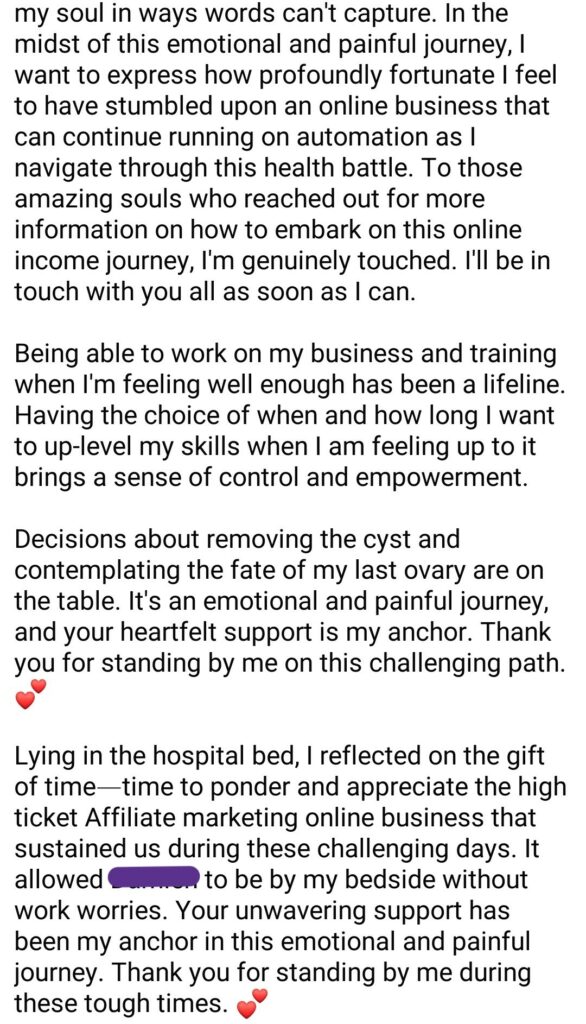
Ugh. Please say no, and build something you can be proud of instead.
SUMMARY
High-ticket affiliate marketing is just multi-level marketing with a different name.
Less than 1% of people who join an MLM make any profit.
Your desperation and their pressure on you to make sales will push you do spammy, icky things in the name of ‘marketing’.
Verdict: Start a legitimate online business instead
Final note: If you’ve joined an MLM, please don’t beat yourself up. You’re not stupid, or weak, or a terrible business person – they’ve invested millions into working out how to lever people’s vulnerabilities to make them sign up and stick around when it doesn’t work as promised.
Instead, take a step back, assess where you are financially and emotionally, and if you need to get out, start taking steps. Cancel payments, leave groups, unfriend other sellers, and get support from your family and friends. You’ll get a lot of pressure from your upline but if you know it’s the right decision, stick with it. You’ll feel better when you’re out.
Pin this post!
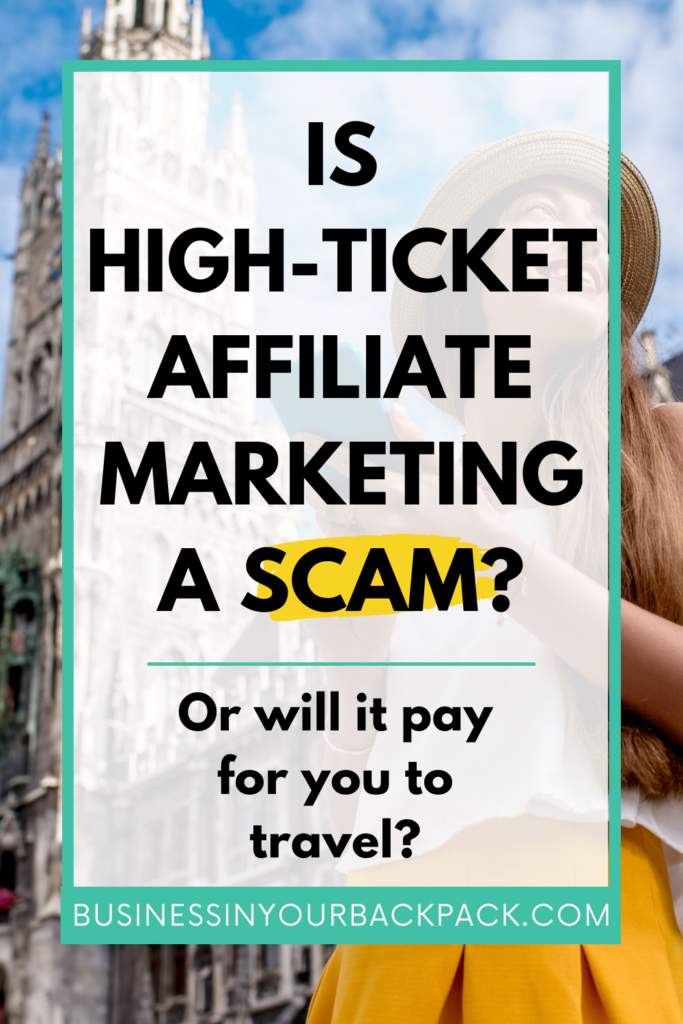


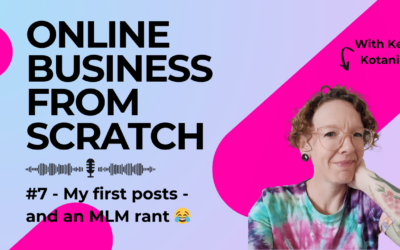
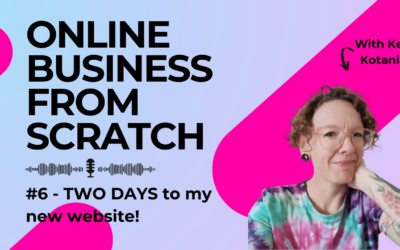
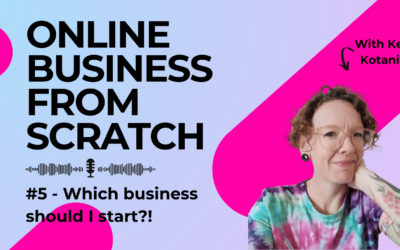
I’ve never heard the term “high ticket affiliate marketing” before. Another course/scam. I hate courses that prey on the vulnerable. This is rather like that clothing business scam that I’ve seen on YouTube, a pyramid scheme of sorts. I thought you meant getting commission on selling very expensive hotels rather than cheap one! That works. It pays my bills.
I love proper affiliate marketing! The term high-ticket has been around for a while, but it just meant selling more expensive products. Selling for an MLM isn’t even affiliate marketing, so they’re now ruining another general term for everyone.
Is LuLaRoe the clothing one? MLMs are everywhere – a couple of years ago it was essential oils like DoTerra, the skincare ones like Monat pop up fairly regularly, and I remember those ridiculous fat-reducing wraps plastered all over IG about 8 years ago. They come, they go, another trend pops up to replace it. And a very select few profit from the hard work and ‘investment’ of the many who spend far more than they ever earn.